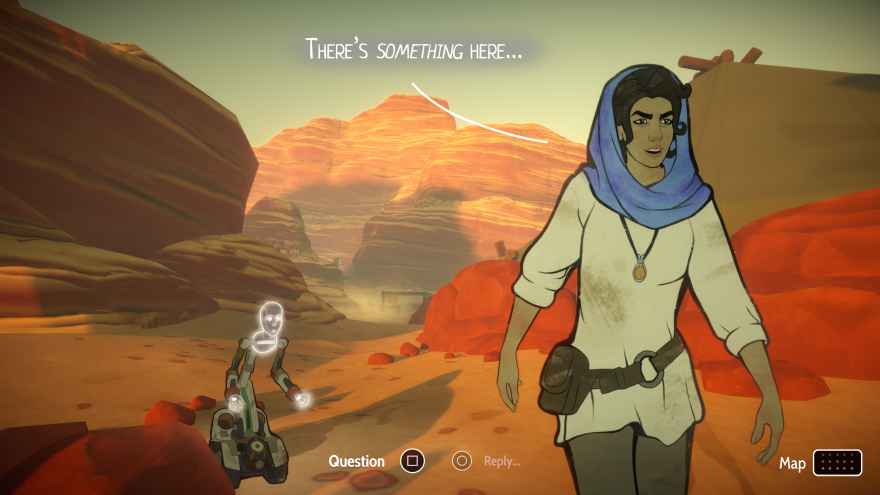Gaming Islam

The following was published in the Martin Marty Center of the UChicago Divinity School on September 14, 2023.
This collaborative research initiative by Alireza Doostdar and Ghenwa Hayek explores representations of Islam and Muslims in video games and in the entertainment industry more broadly.
BY ALIREZA DOOSTDAR | OCT 14, 2022
The protagonist of Inkle Studio’s science-fiction adventure game Heaven’s Vault is an archaeologist by the name of Aliya Elasra who was born on the planet of Elboreth in a faraway nebula. Her name is Arabic, she wears a headscarf, and her planet looks a lot like the old quarter of an Arab Middle Eastern city. But Aliya is not Muslim and neither Islam nor any other earthly religion features in the game.
One of the central characters in Infinity Ward’s first-person shooter Call of Duty: Modern Warfare is Farah Ahmed Karim, the commander of a liberation force battling the Russian occupation of her homeland. Karim’s name is also Arabic. The chemical attack on her city, her torture in prison, even the furnishings in her family home look like they were lifted from portrayals of the Syrian war. But Karim comes from Urzikstan, a fictional Caucasus country bordering the Black Sea whose name is probably a mashup of Uzbekistan and Kyrgyzstan, neither of which have sizable Arab populations.
What do video game characters like Aliya Elasra and Farah Karim teach us about the representation of Islam and Muslims in video games and the entertainment industry more broadly? Two professors at the University of Chicago, Alireza Doostdar (Divinity School) and Ghenwa Hayek (NELC), have embarked on a collaborative multimedia initiative sponsored by the Martin Marty Center to explore these questions. Titled Gaming Islam, Doostdar and Hayek’s three-year project investigates the role of Islam and Muslims in video games, with a focus on how Islamic theology, historical events and personas, rituals, and aesthetics are represented, reimagined, and remixed, as in the cases of Farah and Aliya.
The electronic game industry is the biggest and fastest-growing entertainment industry in the world. With a global consumer base that cuts across distinctions of gender, class, religion, culture, and generation, video games increasingly shape how we spend our leisure time. Games, and the logic of gaming, are also seriously impacting time spent doing other things, through subtle processes like “gamification” (where elements from game playing are applied to other domains, like shopping and education) and not-so-subtle processes like military recruitment and police training.
Social scientists and humanists have long tried to make sense of games and their significance from a whole host of scholarly perspectives. The role of religion in games and gaming is one growing subtopic in game studies, but it remains in its infancy. Within this sub-field, the place of Islam and Muslims is among the least studied, even as they are overtly and covertly represented and appropriated in all manner of ways and across a vast selection of titles: from fantasy adventure games like The Legend of Zelda, Prince of Persia, and Heaven’s Vault, through speculative histories like Assassin’s Creed and the upcoming Naser: Son of Man to action adventures like Uncharted 3 and first-person shooters like Call of Duty: Modern Warfare. This is to say nothing of the many independent games produced by Muslims for Muslims, whose imaginations of Islam are conditioned by a variety of political, economic, and cultural forces.
With Gaming Islam, Doostdar and Hayek plan to contextualize and historicize these depictions within a long history of representing Islam in cultural texts—from art books to scholarship to film—with acute attention to how choices are made to portray differences of gender and race. But their aim is not just to produce specialized scholarship. Gaming Islam’s central output will be a series of video-recorded gameplay commentaries on both mainstream and independent games. In addition, Doostdar and Hayek are planning to design a co-taught undergraduate course on “Gaming Islam” for students at the University of Chicago, as well as a workshop bringing together scholars, game developers, designers, and advocates of gaming inclusion, diversity, and equity.
Gaming Islam is also about the love of gaming. Doostdar and Hayek both grew up playing video games, and this project is allowing them to bring together their academic expertise with something they have long enjoyed doing. This is also why they insist that the results of their study should not be limited to textual academic scholarship. Their goal is to make what they learn accessible and interesting for as wide an audience as possible. Most importantly, they hope to reach audiences that are not often addressed by academics. Gaming Islam will engage fellow gamers, but it also plans to raise awareness of questions of cultural representation for key actors in the gaming industry—producers, developers, writers, artists, designers, musicians, and others—to help them make better, more inclusive, games in the future.
For updates on Gaming Islam, follow the project on social media: Twitter (@gamingislamshow), Instagram (@gamingislamshow), Youtube (@gamingislamshow), and Twitch (@gamingislam).